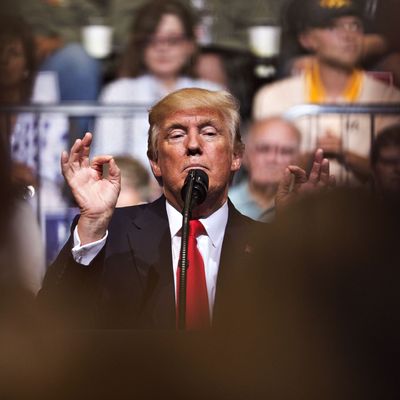
Donald Trump spent much of the 2016 campaign playing a class traitor. During the Republican primary, the mogul decried the way that “greedy, greedy, greedy” rich people, like himself, routinely buy political favors from our elected representatives. Throughout the general-election race, Trump identified himself with America’s “forgotten men and women,” while savaging Hillary Clinton for her connections to Wall Street titans and “international bankers.”
In the GOP nominee’s final campaign ad, he informed America that “those who control the levers of power in Washington” do not “have your good in mind,” as a sign reading Wall St. flickered across the screen. Moments later, the chief executive of Goldman Sachs appeared, cast as an embodiment of the global elite that has “robbed our working class.”
Shortly thereafter, the president-elect assembled a cabinet full of Goldman Sachs veterans, Wall Street tycoons, and his fellow silver-spoon-sucking billionaires.
Trump seems to be a tad self-conscious about the dissonance between his campaign’s rhetoric about the titans of finance and his administration’s taste in personnel. On Wednesday night, the president addressed supporters at a rally in Cedar Rapids, Iowa. The event was framed as a populist hero’s glorious homecoming. Plastered across the walls throughout the arena were lists of “Promises Kept.” The president expressed his relief at finally leaving that “Washington swamp” to spend some time with “the truly hardworking people.”
Something about this setup made Trump feel compelled to address the elephants in the Roosevelt Room.
The president lauded the wealth of his top economic adviser — and former Goldman Sachs executive — Gary Cohn, along with that of his billionaire Treasury secretary, Wilbur Ross, before explaining, “In those particular positions, I just don’t want a poor person — does that make sense?”
From one angle, there’s little dissonance between the president’s populist persona and this remark. His campaign was built around the premise that wealth is equivalent to merit. And right-wing populists have always disdained the “poor,” who, like the globalist rich, exist as parasites upon the hardworking “people.”
But then, as that last bit suggests, such demagogues have always maintained a distinction between the industrious rich and the money-changers. Part of Trump’s appeal is that his wealth appears to be made by building big, tangible things. He and his romanticized working-class supporters are makers. Wall Street and poor nonwhite people are takers.
And it’s not like the only alternative to appointing billionaire financiers was to pluck someone off the welfare rolls. Trump’s remark, like his staffing decisions, cannot be reconciled with his campaign’s ethos. The president has little to offer anyone who voted for him on the basis of the “punching up” side of his populism.
Happily, almost no one did. And none of Trump’s cabinet appointments impair his credibility when punching down.
(America is already great — at making immigrants less financially secure to appease the resentment of the native-born.)






























